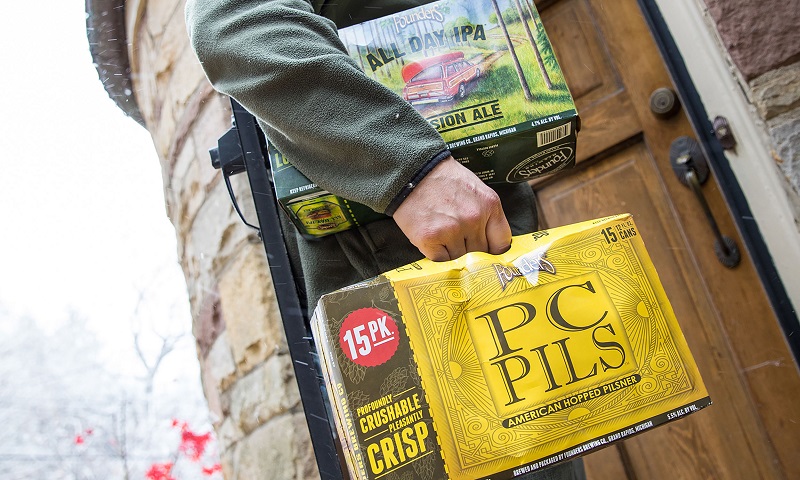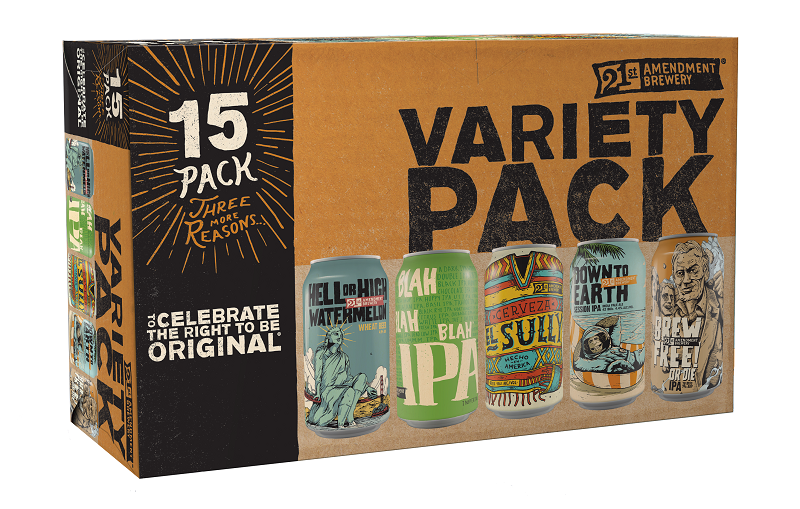Value and Volume: Why More Breweries Are Embracing 15-Packs

(Photo courtesy Founders Brewing Co.)
Ninety-five percent. Since introducing All Day IPA 15-packs in 2014, that has been the volume growth experienced by Founders Brewing Co. out of Grand Rapids, Michigan, a rate that earned it the title of the top-growing craft brand in the country in 2016.
“It’s just killed it,” said Dave Engbers, co-founder of Founders. “It’s the number-one selling craft can pack in the United States. It’s the number three largest volume craft IPA in the country.”
Other breweries that have taken notice of All Day’s success include 21st Amendment Brewery, Southern Tier Brewing Co., New Belgium Brewing, Full Sail Brewing, Golden Road Brewing and Highland Brewing Co., all of whom have added 15-packs since All Day’s debut.
“For us, the 15-pack was more of a play about being different and stepping outside of the box a little bit,” says Dave Wilson, president of 21st Amendment, which began offering its flagship Brew Free! or Die Hard IPA in 15-packs, as well as a seasonal 15-pack and a variety 15-pack, in spring of 2017.
“I wish I had some wood to knock on, but year-to-date we’re up [in volume] for a couple of reasons—one is new brands, two is the 15-pack velocity,” he continues.
All Day IPA was first introduced in limited quantities of bottled six-packs. But after switching the beer to cans and trying out Founders’ analyst Bob Kaiser’s idea of a value pack—or a package that would cost as much as a 12-pack formerly did, but with three extra beers—the brand exploded. From 2014 to 2016, corresponding with Founders’ swift total volume growth, All Day IPA’s volume sales grew 187 percent.
“The bottom line is people want more beer,” says Engbers. “When you look at it from a value perspective, it makes sense that it’s outpacing bottle sales significantly.”
Why the number 15? Engbers offers two reasons. First is canning and packaging capabilities: It’s easy to add another row of three beers to a packaging format in both of those cases, and the extended three-in-a-row format still allows the package to fit neatly on store shelves. Second was Kaiser’s inspiration from Stroh Brewing Co. in Detroit, which offered a 15-pack in the 1980s as its brewery was on the downturn—though Engbers emphasizes a downturn was not the case for Founders when it rolled out the 15-pack, and that All Day instead proved a catalyst for expansions in distribution and into canning.
21st Amendment made the move to the 15-pack as a value proposition, as opposed to the idea of a value pack. Founders distribution was slow to reach Northern California, and that allowed 21st Amendment to be one of the first on the market with the new format.
“We had a choice to make,” says Wilson. “We could either compete with people, 12-pack for 12-pack, and go after a price thing, or we could stay the course and not go after price, or we could do something with our packaging and raise the price, and that’s what we did.”
“Are three cans of beer worth the two dollars more?” he continues. “Right now what we’re seeing is that people are doing the math and saying, ‘Yeah, that’s a great deal.’”

(Photo courtesy 21st Amendment Brewery)
In September, 21st Amendment gave the 15-pack treatment to an IPA variety pack as well as its popular Blood Orange Brew Free! Or Die IPA.
“We literally have not been able to brew enough of that beer,” says Wilson. “We have not been able to keep up.”
With All Day IPA’s recent migration to 19.2-ounce cans, Founders is already looking toward the brand serving as a catalyst to yet another possible expansion in packaging: single-serve convenience beers. According to Founders’ Kaiser, 19-24-ounce single-serve packages are the leading package growth for convenience sales. Engbers cites stadium and sports settings as prime venues for the new All Day can.
Lagunitas already has joined that arena with its 12th of Never 19.2-ounce cans, and Oskar Blues has long been a major player in the “stovepipe” market (Oskar Blues also added a 16-pack of its Pinner Throwback IPA in late 2016). 21st Amendment once offered its Toaster Pastry India-style Red Ale in 19.2-ounce cans, but discontinued the brand due to shifting focuses and the lack of support from other 19.2-ounce single-serve cans on shelves.
“It just sat there and looked really odd by itself,” says Wilson. “We’re really excited to see other people open that up. Now that it’s come to be a possible player, we’re geared and ready to roll. If that’s an opportunity, we can jump on it quick.”
Currently, Founders owns 62 percent of the market for “craft” 15-18 packs. All Day IPA makes up 55 percent of that market. Other 15-packs offered by Founders include Centennial IPA, PC Pils, Azacca IPA and Mosaic Promise.
Bo McMillan is the former editorial assistant for All About Beer Magazine, and is currently pursuing his PhD in English and Comparative Literature at Columbia University.”

I’m curious about all the BPA in the plastics lining those cans.